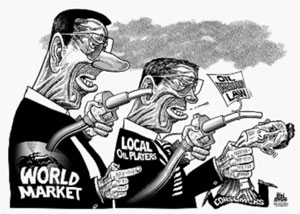A brief breather

Not that we expect it to last long. Due to government pressure—a threat to investigate by the Department of Justice (DOJ)—the Big Three and independent oil producers all dutifully reduced fuel pump prices by 30 to 50 centavos short of the P2 sought by the Aquino administration.
Were it not for the administration’s popularity and the fact that the DOJ had been pictured as a no-nonsense pursuer of errant personalities, these oil firms would not have given a hoot and gone on collecting profits despite the steep drop of prices in the global oil market.
Then again we’d like to think that there is some heart beating under the piles of money earned by these companies.
While we can be thankful for small favors, PUV operators aren’t so happy.
They wanted oil firms to do even more like lower fuel prices to P30 a liter across the board, a demand that oil companies could only yawn at and brush aside.
Article continues after this advertisementHow long can the Palace keep up the pressure?
Article continues after this advertisementNot for long. Even the Cebu provincial government is left wondering what happened to the complaint it filed with the DOJ on the high fuel pump prices in the province compared to Luzon and Mindanao.
Unlike fuel price increases, few can see a correlation between fuel price rollbacks and the prices of basic commodities. If anything, the cost of goods and services will remain and only go higher with the next fuel price hike. They never roll back.
This underscores the need to build a national oil exchange to complement or even outrightly replace the deregulated oil industry law in the country. Under this setup, buyers are guaranteed prices that reflect the actual conditions of the world market without the imposition of the Big Three and the other “independent” oil producers.
A deregulated oil industry was supposed to ensure consumers a better chance of enjoying lower fuel prices but sweeping changes in the world economy have given local oil firms all sorts of excuses to raise their pump prices further and with it, the collective frustration of both operators and the riding public.
A national oil exchange would do more than just act as a barometer of the global fuel market. It would also provide buyers a wider choice of suppliers to choose from—suppliers that are more sensitive to consumer sentiment and may provide cheaper, quality products.